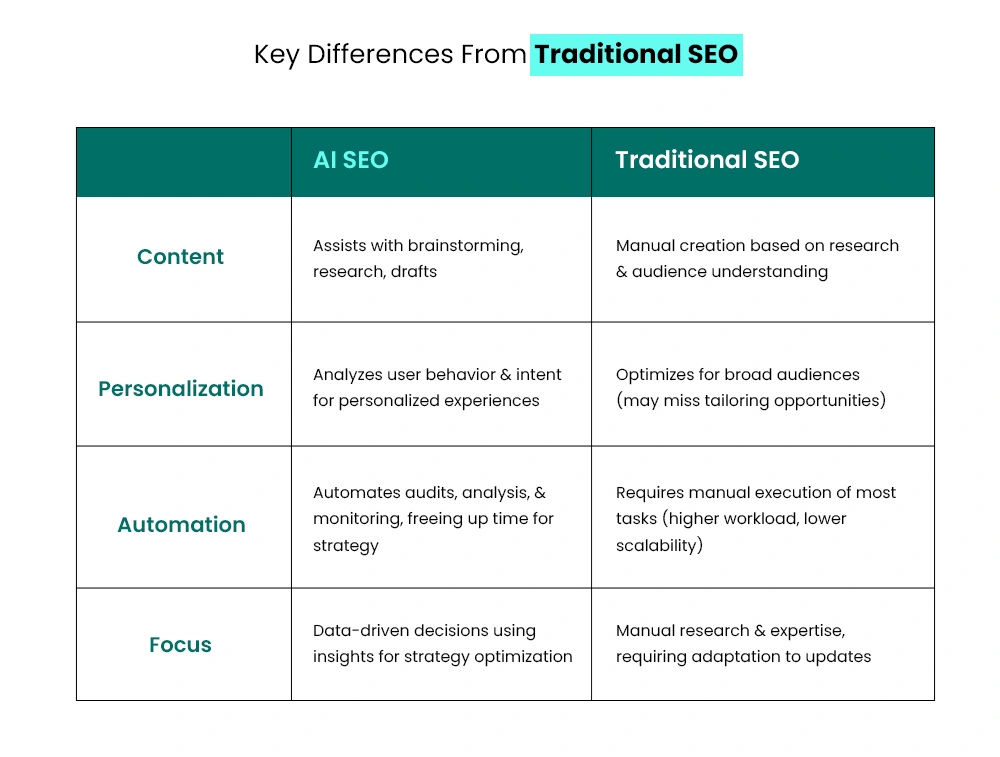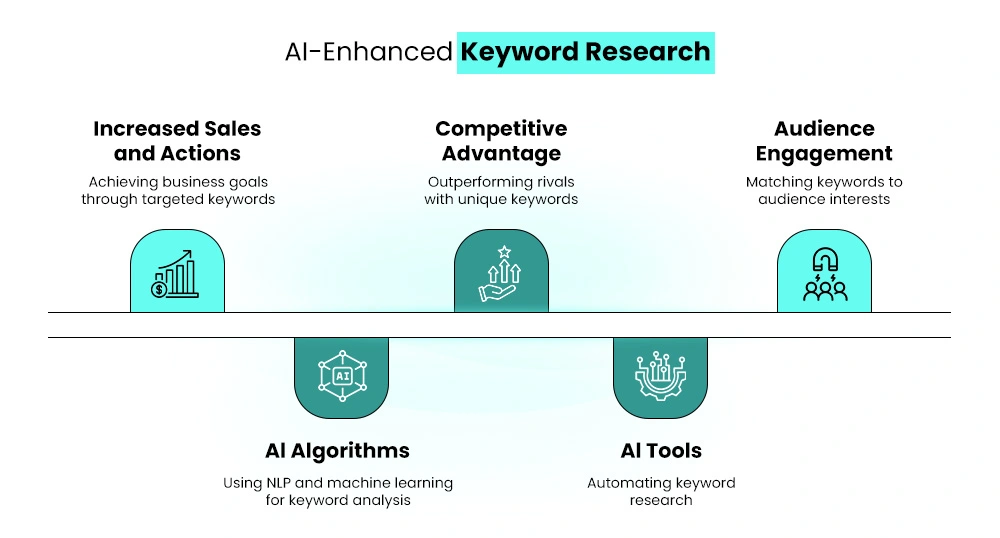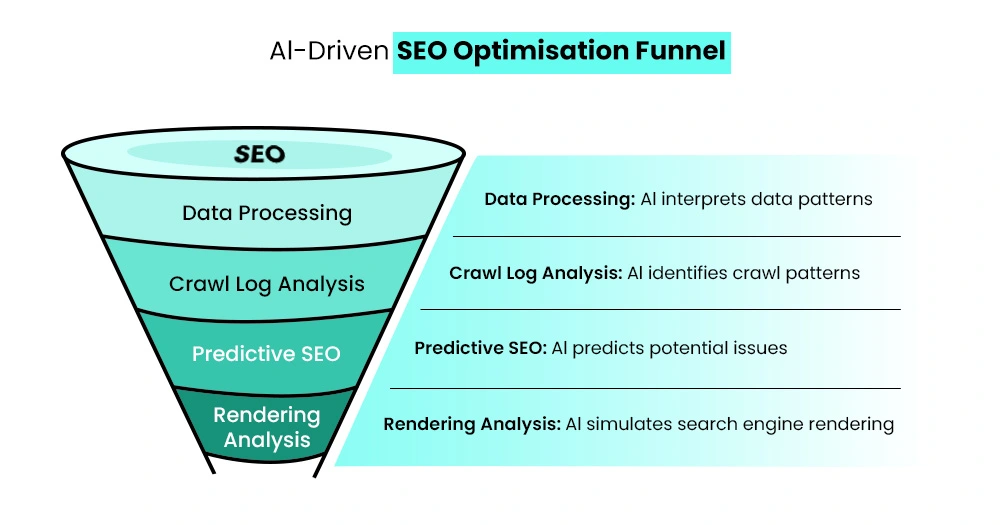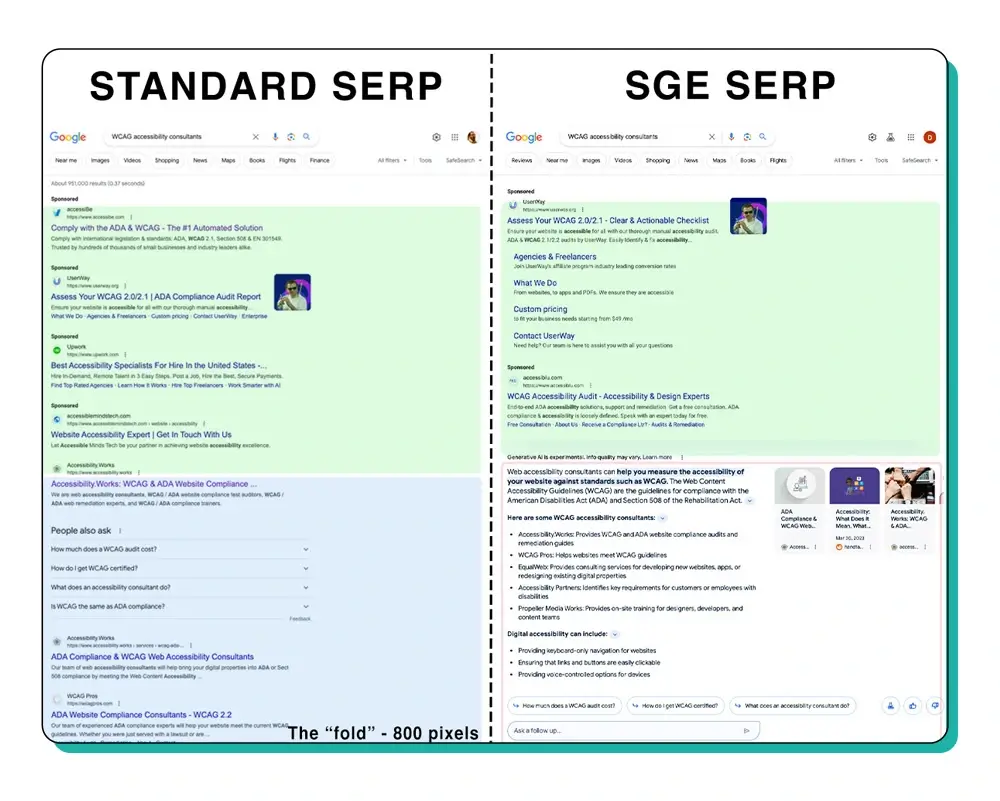AI SEO Strategies: What Even Big Brands Must Consider In 2025
Artificial intelligence is reshaping search and content discovery, making AI SEO essential for every business, regardless of size or budget. In fact, over 86 % of SEO professionals now integrate AI into their strategies, underscoring how vital adaptation is in 2025. Search engines now rely heavily on machine learning, natural language processing, and real-time data to understand intent and deliver highly personalized results.
In 2025, enterprise SEO faces a pivotal shift. Algorithms increasingly prioritize context, user behavior, and predictive analytics, leaving traditional keyword tactics behind. Even big brands with massive marketing budgets cannot rely on old strategies to maintain visibility.
AI-powered automation, advanced personalization, and dynamic ranking factors demand a complete rethink of how content is planned, created, and optimized. From conversational search to voice-driven queries, users expect relevant answers instantly across devices and platforms.
For enterprise teams, adopting AI SEO is no longer optional—it is the foundation for competitive dominance. Companies that integrate AI-driven insights, structured data, and automated optimization will capture search share and brand authority.
This article explores the critical AI SEO strategies every major brand must embrace in 2025 to stay relevant, reach target audiences, and outperform agile competitors in an AI-first digital landscape.
How To Understand AI SEO in 2025?
AI SEO strategies 2025 focus on adapting to conversational search and predictive algorithms.
Brands must optimize content for natural language, user intent, and real-time personalization to stay visible. AI-driven insights ensure higher rankings and stronger engagement across evolving search platforms.
How Search Engines Now Use AI?
Search engines now rely heavily on machine learning in search to interpret queries and deliver precise results. AI algorithms analyze user behavior, context, and intent in real time for higher relevance.
Modern ranking systems use natural language processing (NLP) to understand conversational phrases and long-tail queries. These advancements let search engines grasp semantics, synonyms, and nuanced meanings beyond simple keywords.
Personalized results are powered by continuous learning from user interactions across devices and platforms. For brands, adopting AI SEO strategies is essential to stay competitive in this AI-driven environment.
Optimizing for structured data, conversational content, and intent-focused keywords helps match AI-driven ranking signals. Big brands must integrate these tactics to maintain visibility and authority in 2025’s evolving landscape.
Search engines’ AI evolution rewards content that anticipates user needs and provides clear, actionable information faster than traditional SEO methods.
Key Differences from Traditional SEO
AI-driven optimization changes how search visibility works compared to old methods. The top AI SEO strategies focus on anticipating user intent and real-time personalization, not just static keywords.
- Predictive SEO modeling uses historical data and trends to forecast search demand, helping brands publish content before competitors.
- Machine learning in SEO continuously refines rankings by analyzing behavior signals, context, and engagement, unlike fixed algorithm updates.
- Conversational content and natural language queries replace keyword stuffing and rigid metadata.
- Automation tools handle technical tasks—like schema markup or internal linking—faster and more accurately than manual work.
These advances demand dynamic content planning and data-driven decisions, making AI-first approaches essential for sustainable search success in 2025.

– Checkout Our BFCM Offer Here: Mastroke BFCM Offer- Launch Your Dream Shopify Store at just $99!
Core AI SEO Strategies Big Brands Cannot Ignore
Big brands must adopt AI-driven tactics to stay competitive. Essential moves include predictive SEO, automated content optimization, conversational search targeting, and machine-learning insights.
These strategies enhance personalization, improve rankings, and future-proof enterprise websites against evolving algorithms dominating search in 2025 and beyond. Here are some of the AI SEO strategies that you can use:
1. AI-Assisted Keyword & Topic Research
AI-driven content optimization has transformed how brands discover high-performing topics. Modern AI keyword research tools analyze billions of search queries and predict emerging trends with remarkable accuracy.
Key tactics include:
- Predictive keyword modeling: AI forecasts seasonal spikes and long-tail opportunities before competitors notice them.
- Automated keyword clustering: Algorithms group related terms into semantic clusters, helping content teams build topic authority efficiently.
This approach improves search intent matching and creates content ecosystems that dominate SERPs. Recent studies also show a 25% increase in AI use for keyword research over the past year, with 70% of SEO professionals believing AI-powered tools will revolutionize keyword strategy.

AI systems also identify content gaps, revealing high-value keywords your audience is likely to search for in the coming months. These insights allow big brands to plan editorial calendars based on data-driven forecasts rather than guesswork.
By integrating predictive modeling with automated keyword clustering, enterprise marketers can streamline strategy, reduce manual analysis, and target search terms aligned with user intent. In 2025, successful SEO depends on proactive discovery, and AI-assisted research ensures your Shopify or enterprise site remains ahead of shifting consumer behavior and evolving search algorithms.
– Read our festive blog here: 12+ Holiday Season Marketing Ideas Shopify Stores Can Use to Boost Sales
2. Content Generation & Optimization with AI
AI SEO now powers scalable content creation without losing human creativity. Generative AI for SEO content accelerates production while supporting brand voice and originality.
Key advantages include:
- AI-driven semantic gap analysis: Identifies missing topics and related entities for stronger topical authority.
- Entity optimization: Ensures search engines understand context and relationships, improving rankings.
AI in technical SEO streamlines metadata optimization, schema markup, and internal linking to enhance site performance. Content personalization tools deliver tailored experiences, improving engagement and conversions.
Generative AI for SEO content assists in drafting outlines, headlines, and keyword-rich sections, letting writers focus on storytelling and strategy. AI platforms like Clearscope or Surfer use predictive models to align content with evolving search intent.
By blending AI automation with human insight, brands can:
- Scale content production across multiple channels.
- Maintain a consistent tone and brand message.
- Adapt quickly to algorithm updates.

AI SEO empowers teams to meet rising content demands while ensuring every article is search-ready, relevant, and engaging. This synergy keeps big brands competitive in 2025’s dynamic search landscape.
3. AI in Technical SEO
AI in technical SEO is redefining how enterprise websites maintain speed, structure, and visibility. Automation handles complex audits and identifies hidden performance issues in real time.
Key applications for SEO in 2025 include:
- Automated site audits: AI tools quickly detect broken links, duplicate content, and indexation errors, ensuring consistent technical health.
- Structured data markup: AI-driven schema generators add accurate structured data markup, increasing eligibility for AI-driven SERP features like rich snippets and knowledge panels.
- Intelligent internal linking: Algorithms recommend optimal linking paths to strengthen site architecture and distribute link equity efficiently.
AI platforms also optimize crawl budgets by analyzing log files and prioritizing high-value pages for indexing. Predictive models flag potential load-time issues before they impact rankings or user experience.

Performance optimization benefits include:
- Faster page speed through automated image compression and code refinement.
- Proactive identification of mobile usability problems.
- Ongoing monitoring for Core Web Vitals compliance.
By leveraging AI in technical SEO, brands enhance crawl efficiency, reduce manual errors, and stay competitive. Automated insights ensure large Shopify or enterprise sites remain search-friendly and adaptable in a rapidly evolving digital landscape.
4. Personalization & User Experience
AI SEO in 2025 prioritizes user-first experiences through advanced personalization and predictive engagement. AI-powered content personalization tailors messaging to each visitor, increasing relevance and conversions.
Key tactics include:
- AI-driven content recommendations: Algorithms analyze browsing patterns to serve dynamic product suggestions or blog posts aligned with user interests.
- Predictive user journeys: Machine learning anticipates next actions, delivering timely CTAs, offers, or resources that guide visitors toward purchase decisions.
- AI content optimization: Tools adjust page layouts, headlines, and visuals in real time to match user preferences and behavior signals.
Content personalization at scale allows brands to test and refine experiences without heavy manual work. Automated A/B testing runs multiple page variations simultaneously, identifying the most engaging design and copy elements.
AI-powered content personalization also supports adaptive navigation, ensuring site menus and search bars adjust to audience intent. Heatmaps and behavioral analytics reveal friction points, enabling continuous improvement.
For Shopify merchants and enterprise brands, AI SEO strategies enhance dwell time, reduce bounce rates, and boost repeat visits. By delivering uniquely relevant experiences, companies build stronger relationships and stand out in competitive AI-driven search results.
5. Voice and Visual Search AI Optimization
AI SEO strategies in 2025 must prioritize voice and visual search SEO as consumers increasingly rely on conversational and image-based queries. AI-first Google indexing rewards brands prepared for multi-modal discovery.
Essential tactics include:
- Conversational content: Use natural, question-based language to match how people speak to smart devices or voice assistants.
- Featured snippets and FAQs: Structure concise answers with clear headings and bullet points to increase voice search visibility.
- High-quality visuals: Optimize product images with descriptive file names, alt text, and captions to rank in visual search results.
- Structured data markup: Add schema for products, reviews, and FAQs so AI systems can interpret and display content across platforms.
Voice and visual search SEO also benefits from localized optimization. Include long-tail, geo-specific keywords to capture nearby shoppers searching by voice or camera.
AI-first Google indexing rewards fast-loading, mobile-friendly pages with precise metadata and accurate structured data.
For enterprise brands, integrating voice and visual strategies ensures their content surfaces when users ask or snap, not just when they type. Embracing these AI SEO strategies strengthens reach, drives organic traffic, and keeps brands competitive in evolving search ecosystems.
6. AI-Generated SERP Features & SGE Visibility
AI SEO strategies now focus on winning AI-driven SERP features and optimizing for Google’s Search Generative Experience (SGE). Big brands must adapt to appear in AI-generated answers that dominate visibility in SEO in 2025.
Key actions include:
- Google SGE optimization: Structure content with clear headings, concise summaries, and factual data to help Google surface accurate AI-generated responses.
- AI for site audits: Use AI tools to identify content gaps, schema issues, and opportunities for snippet inclusion across complex websites.
- Structured content: Implement schema markup for FAQs, products, and reviews, ensuring search engines understand context and relationships.
- Authoritative sources: Publish expert-backed, original insights that AI systems can confidently quote in dynamic answer boxes.
AI-driven SERP features reward brands that provide comprehensive, trustworthy information. Rich media, tables, and bullet points increase the chance of inclusion in featured snippets and knowledge panels.
Google SGE optimization also benefits from fast-loading, mobile-friendly pages and strong internal linking.

By combining structured data with AI for site audits, brands strengthen their presence in AI-generated SERP features. Proactive AI SEO strategies ensure consistent visibility as generative search shapes the future of organic discovery.
– Read our festive blog here: Top 6 Holiday Marketing Tips For Shopify Brands On a Tight Budget
Common AI SEO Mistakes Big Brands Still Make
Here are some of the common AI SEO mistakes almost every big brand makes. Read below:
1. Over-automation Without Human Oversight
Many brands over-rely on automation, ignoring key AI SEO best practices. Excessive automation weakens creativity and context.
AI SEO strategies need skilled editors to maintain brand voice and accuracy. Predictive SEO works best when experts validate data and refine AI outputs.
Without human checks, automated content may misinterpret intent, harm rankings, and reduce user trust. Smart brands combine automation with expert review to safeguard quality.
Balancing predictive SEO insights and human judgment keeps campaigns adaptable and relevant in 2025. Human oversight ensures AI-driven efforts meet evolving search standards and audience expectations.
2. Neglecting E-E-A-T Signals in AI-written Content
Many brands overlook E-E-A-T and AI content alignment, risking credibility and trust. AI SEO demands clear author expertise, experience, and transparent sourcing.
Automated internal linking must support authoritative pages, reinforcing topical authority and user trust. Without E-E-A-T signals, AI-driven articles may rank briefly but lose visibility over time.
Google values first-hand experience and expert review, even in automated workflows.
Combine AI SEO efficiency with verified authorship, fact-checked data, and thoughtful linking to maintain high-quality standards.
Prioritizing E-E-A-T ensures AI-generated content remains authoritative, reliable, and competitive in the evolving 2025 search landscape.
3. Prioritizing Scale Over Actual Topical Authority
Many brands misuse AI SEO tools to chase mass output instead of depth. Brand SEO scalability should never replace strong topical expertise and trustworthy insights.
Flooding pages without focused expertise weakens rankings and user trust. Real-time SEO analytics reveal gaps in authority and audience alignment.
Overproduction risks thin content, duplicate topics, and diluted brand value. Successful AI SEO balances scalability with deep research, expert validation, and consistent niche leadership.
Focusing on true topical authority ensures long-term visibility, meaningful engagement, and sustainable growth in the competitive 2025 search landscape.
– Read our festive blog here: Post-Holiday Marketing Strategies: Preparing Your Shopify Store for 2026
Action Plan for Big Brands (and Everyone Else) in 2025
Adopt AI SEO strategies early. Use AI tools for audits, content personalization, and predictive SEO insights.
Combine automation with expert oversight to maintain quality. Continuously track algorithms, update structured data, and refine topical authority for sustainable search dominance in 2025.
1. Invest in Hybrid AI-human SEO Workflows
Big brands SEO success in 2025 demands a balanced approach. AI SEO offers speed, predictive insights, and automated analysis but can’t replace human creativity or contextual judgment.
Avoid AI SEO pitfalls by combining generative tools with expert editors for strategy, storytelling, and compliance. Human oversight ensures accuracy, brand voice, and E-E-A-T signals remain strong.
Integrate AI for data-driven keyword research, automated audits, and real-time analytics. Let humans refine messaging, optimize user experience, and guide long-term goals.
This hybrid model creates adaptable campaigns that scale efficiently while preserving quality and competitive advantage in evolving search environments.
2. Integrate AI Auditing/Monitoring Systems
Integrating AI auditing and monitoring systems is crucial for enterprise AI SEO. These systems ensure accuracy, compliance, and adaptability in complex search environments.
For semantic search optimization, monitoring detects keyword intent shifts and algorithmic updates. Continuous auditing safeguards data quality, boosts targeting precision, and prevents ranking declines.
Big brand SEO requires proactive oversight since outdated strategies can erode visibility. Automated monitoring provides real-time alerts, helping enterprises adjust campaigns quickly.
By auditing AI-driven actions, brands maintain competitive advantage. Effective oversight builds trust, enhances scalability, and ensures long-term SEO performance aligned with evolving search standards in 2025.
3. Continuous Refinement with Algorithm and User Shifts
Continuous refinement is essential for AI SEO as algorithms and user expectations constantly evolve. Search engine AI updates reshape ranking factors, demanding ongoing strategy adjustments.
Ignoring shifts risks outdated tactics that reduce visibility. Big brands’ SEO depends on continuous optimization to stay competitive in dynamic markets.
Refinement requires tracking audience behaviors, adapting content, and aligning structures with new algorithm preferences. User intent changes rapidly, so real-time adaptability protects authority and traffic.
Brands maintaining flexibility can respond faster than competitors. Effective refinement ensures resilience, stronger reach, and lasting performance even as 2025 search landscapes become more unpredictable and complex.
– Read our festive blog here: National Free Shipping Day: How Shopify Brands Can Turn One Day Into Long-Term Sales
Conclusion
In 2025, AI SEO is no longer optional but foundational for brand visibility and competitiveness. Big brands must embrace advanced strategies to adapt to evolving search landscapes.
Google SGE optimization plays a critical role in shaping how answers, snippets, and user experiences are delivered in search results. Businesses that ignore SGE will risk losing search presence to faster, smarter competitors.
AI-driven content optimization ensures relevance, engagement, and the alignment of content with shifting user intent and semantic patterns. Continuous oversight, auditing, and refinement safeguard long-term consistency and performance.
Big brands must commit to innovation while balancing compliance and user trust. Success requires integrating proactive monitoring, scalable execution, and adaptive creativity into every SEO initiative.
By refining AI strategies, brands can outmaneuver competitors and thrive in complex environments. Ultimately, mastering AI SEO today ensures authority, growth, and resilience for tomorrow’s unpredictable digital economy. Future-ready brands will lead, not follow.
FAQs-
1. How is AI transforming SEO in 2025?
AI is reshaping SEO by analyzing user intent faster, automating content optimization, and producing predictive insights for search trends. Search engines now prioritize AI-informed content that delivers user value. Big brands must adopt machine learning for keyword modeling, voice search, and semantic optimization to maintain visibility in AI-influenced search results.
2. Why should big brands focus on AI-powered SEO tools?
AI-powered SEO tools significantly reduce manual research and accelerate data analysis. They uncover keyword gaps, automate on-page recommendations, and personalize content experiences. For large brands, this scalability ensures consistent optimization across thousands of pages, improving domain authority and traffic without compromising brand voice or accuracy.
3. What is programmatic SEO, and how is AI shaping it?
Programmatic SEO uses AI to automate page creation for niche, long-tail queries through structured templates. This enables brands to scale organic reach efficiently. AI ensures each page is contextually relevant, keyword-rich, and aligned with user intent — crucial for ecommerce and multi-product enterprises.
4. How does AI enhance predictive analytics in SEO?
AI-driven predictive analytics helps brands anticipate algorithm changes, search behavior shifts, and content opportunities. It evaluates past performance, audience data, and SERP trends to forecast which content or keywords will perform better, allowing marketers to act proactively instead of reactively.